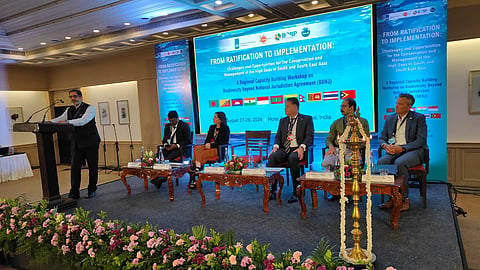

CHENNAI: PK Srivastava, Advisor to the Union Ministry of Earth Sciences, said that India is all set to sign the Biodiversity Beyond National Jurisdiction (BBNJ) Agreement, also called High Seas Treaty, in the next General Assembly of the United Nations to be held next month. He was speaking at a high-level two-day workshop that began here on Tuesday focusing on the implementation of the Agreement.
He also said that the Ministry will establish a dedicated institutional mechanism to oversee the developments regarding the Agreement. “This authority will deal with the necessary regulations, studies, and other activities related to the treaty”, Srivastava said, emphasising that there is a need for detailed discussions and modification to existing legislation to ensure compatibility with the requirements for the effective implementation of the treaty.
The Environment Protection Act 1986 could be used for the environmental impact assessment of the BBNJ Agreement, he said. The Union Cabinet had approved India to sign the BBNJ agreement in July.
Citing the challenges ahead, he further said that developing priorities, resource sharing, research and development, and capacity building are some immediate tasks that must be carried out with regional cooperation. “There is a strong need to leverage regional partnership between the South and South-East Asian countries for capacity building in this direction”, he added.
The workshop was attended by diplomats, policymakers and senior marine scientists from South and Southeast Asian countries, including Bangladesh, India, Maldives, Sri Lanka, Nepal, Cambodia, Thailand, Indonesia, Bhutan, Myanmar, and Timor-Leste.
According to experts, ratification of this treaty is a crucial step in protecting the high seas, which offers scores of services, including climate regulation and enhancing the blue economy. They emphasised the urgency of enhancing marine governance and the need for capacity building and technology transfer to achieve these goals.
The workshop is being organised by the Bay of Bengal Programme Inter-Governmental Organisation (BOBP-IGO) in collaboration with the High Seas Alliance (HSA) and RISE UP.
A set of recommendations will be developed during the workshop for the effective implementation of the BBNJ Agreement in the region, contributing to the global effort to safeguard marine biodiversity and address the challenges posed by climate change.
Carbon footprint from India’s marine fisheries 17.7% less compared to the global average
Grinson George, Director of the Central Marine Fisheries Research Institute (CMFRI) said that the carbon footprint from India’s marine fisheries by trawlers is 17.7 per cent less compared to the global average. He was speaking at the inauguration of the two-day workshop on the BBNJ Agreement in Chennai. “A recent study by the CMFRI revealed that greenhouse gas emissions per kilogram of marine fish produced in India were only 1.52 kg CO2e.”, he said.
Citing another CMFRI study, George said 91.1 per cent of India’s marine fish stocks are healthy which marks a significant milestone in India's efforts to maintain the sustainability of its marine fisheries.
He also said that scientific data management is pivotal for safeguarding the high seas, and India possesses the necessary facilities to develop this capability.